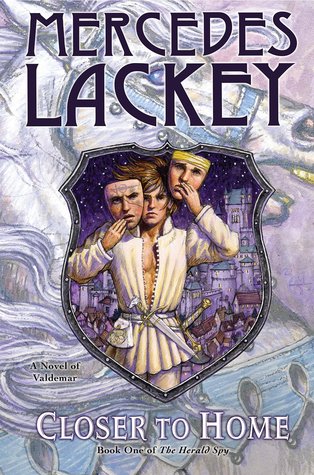SYNOPSIS
Mercedes Lackey begins a new trilogy called The Herald Spy right where she left off the Collegium Chronicles series. Mags continues to work in Valdemar’s capitol as a spy training under the King’s Own (right-hand assistant). His girlfriend, Amily, has discovered that Mags Mindspeaking to her has blossomed an odd Gift in her: she can see and hear through animals’ eyes and ears. She doesn’t envision much use for it and is happy that she’s been asked to tend the greenhouse for Healers, a job she learned from their friend Bear, who is now hired by a family estate and no longer in the series.
As Mags is heading home one windy, freezing night, he sees a horse become frightened by a crashing sound, causing the animal, attached to a wagon, to run off, knocking a man into the river. Mags rescues the poor man and discovers it is his mentor, Nikolas — who dies. But Bear taught everyone he knew “the breath of life,” a version of CPR, and Mags revives his friend. This has never happened to a Herald before. The King’s Own is an essential role, and while new Companions are born or appear in their grove, the King’s Own Companion is always Roland. While Nikolas was dead those precious minutes, Roland Chose Amily. Feeling like a nobody with a shoddy Gift, Amily must take on one of the most important roles in the kingdom immediately.
HIGHS & LOWS
Despite having a curriculum, professors, deans, and basically an internship, I Heralds are flexible about student development. If a Herald trainee needs more assistance, he/she is paired up with a better student, who gladly tutors. Or, in the case of Amily, who has been around Heralds her entire life, whose father was the King’s Own, and who went on circuit with Mags as he completed his Herald training, she’s given a pass on attending formal classes and an internship when she is Chosen to be King’s Own. She’s not a trainee, she forthwith a full Herald. Sure, it’s just a fantasy novel, and yes, this gives Mercedes Lackey a pass on sending Amily through weapons training (she did it), school (she studied in the archives when she was physically disabled), and learning how to control her Gift (she’s listened to everyone else prattle on about how to control theirs). And yet, I couldn’t help but smile at a place where children’s educational needs are met, where advanced students go on and struggling students are lifted up. Educators talk about the imbalance within their classrooms all the time (I experienced it as a professor), but in the U.S. youth slog through grade after grade. Valdemar’s collegium made me smile.
The tension in Closer to Home isn’t some giant kidnapping/overthrow the kingdom thing. Instead, two highborn families, whose houses are in the country, plan to stay in the capitol for a season to find proper marriages for their offspring. It’s political. However, because the letters of intent were sent without forewarning and cell phones don’t exist, the clans, who hate each other, arrive at the same time. There’s a bit of a Romeo and Juliet thing going on with the young people in these families, though Lackey plays with expectations several times, leaving me thinking, “Well, are we doing the Shakespeare tragedy or comedy?!” — in a good way. I’d hate to know exactly what will happen.
While Amily keeps track of the family with three daughters, gifting them a puppy and then using the dog’s eyes and ears to pay attention, Mags plays the role of a fun-loving guy, befriending the family with sons and keeping them out of trouble. Mags and Amily return home each night much like two overworked adults, who want more time to share meals, be intimate, and listen to stories of the other’s day. Alone, Mags and Amily are lovely to read and a joy compared to past Herald couples who pet and fawn over one another like animals. After I finished Closer to Home, I kept thinking about them and wanting to read more right away.
On the side, Mags is still working as a spy while Nikolas recuperates from his near-death, freezy river experience, and in an effort to both gain information all over the capitol and improve the lives of orphaned children, Mags hires a grandmotherly woman to care for any orphan he finds who might serve as a tiny spy. Just listen, he says, and report back anything interesting. It’s a bit mushy that Mags sees himself, a former mine slave, in these children’s faces, and it’s almost too good to be true that he plans to feed, house, and education all the little scamps (why doesn’t the King just build an orphanage if he can pay for all these kids Mags is keeping, you might ask). But I enjoyed watching Mags interact with his “gang” and improve the lives of citizens, especially since we read about so many needy children and how Valdemar can’t save them all in multiple novels.
DISCUSSION QUESTION
What novels have you read that make use of a familiar plot — a fairy tale, Shakespeare, the Bible — and did you enjoy the author’s new vision?





I quite enjoyed this one all the way through- especially when we saw things through Amily’s perspective (though giving Violetta the dog specifically to use it to spy on her family made me raise an eyebrow). It was nice not to have endless angst from these now-grown-up characters.
That’s a good point about the “we can’t save all these children!” perspective. You’d think the crown would put some effort into it with an orphanage or two. Especially after the exorbitant costs of decking out all the Heralds and Herald Trainees in silk uniforms for a wedding…
LikeLike
Right?! There is some bizarre gap between the crown seeming to have endless money and “Oh, guess these kids weren’t meant to live a good life and the super poverty-stricken churches and/or slave owners will pick up the slack.”
LikeLike
In terms of your discussion question – my immediate response was “oh, I’ve read tonnes of them” and then couldn’t think of any at all for ages. I did really love Lords and Ladies by Terry Pratchett – he always uses a lot of references, but that story is particularly influenced by Midsummer Night’s Dream, and I really enjoyed it. Same goes for Hogfather (also by Pratchett), which draws on a lot of different cultures’ “darkest night of the year” myths but especially the story of Father Christmas, and takes it somewhere very unexpected.
LikeLike
I looked up Hogfather and thought it sounded truly interesting! However, it’s the 20th book in the Discworld series. Do you have to read those in any sort of order? Because I’m not looking to take on a new fantasy series project right now, considering Reading Valdemar has taken three years!
LikeLike
You don’t have to read all 19 beforehand but it might not work without knowing the way Death has been developed in the earlier books – so you could read either Mort or Reaper Man and then Hogfather.
LikeLiked by 1 person
I tend to be skeptical of most retellings but I did enjoy the loose spin on Pride and Prejudice that Uzma Jalaluddin did in Ayesha at Last.
LikeLike
Oh! And A.M. Blair (the blogger Amal @ The Misfortune of Knowing) did a retelling of Sense and Sensibility with a modern setting and Sri Lankan characters. I should have mentioned her in my question. I enjoy her books.
I didn’t even think of Austen retellings, of which there are SO MANY.
LikeLiked by 1 person